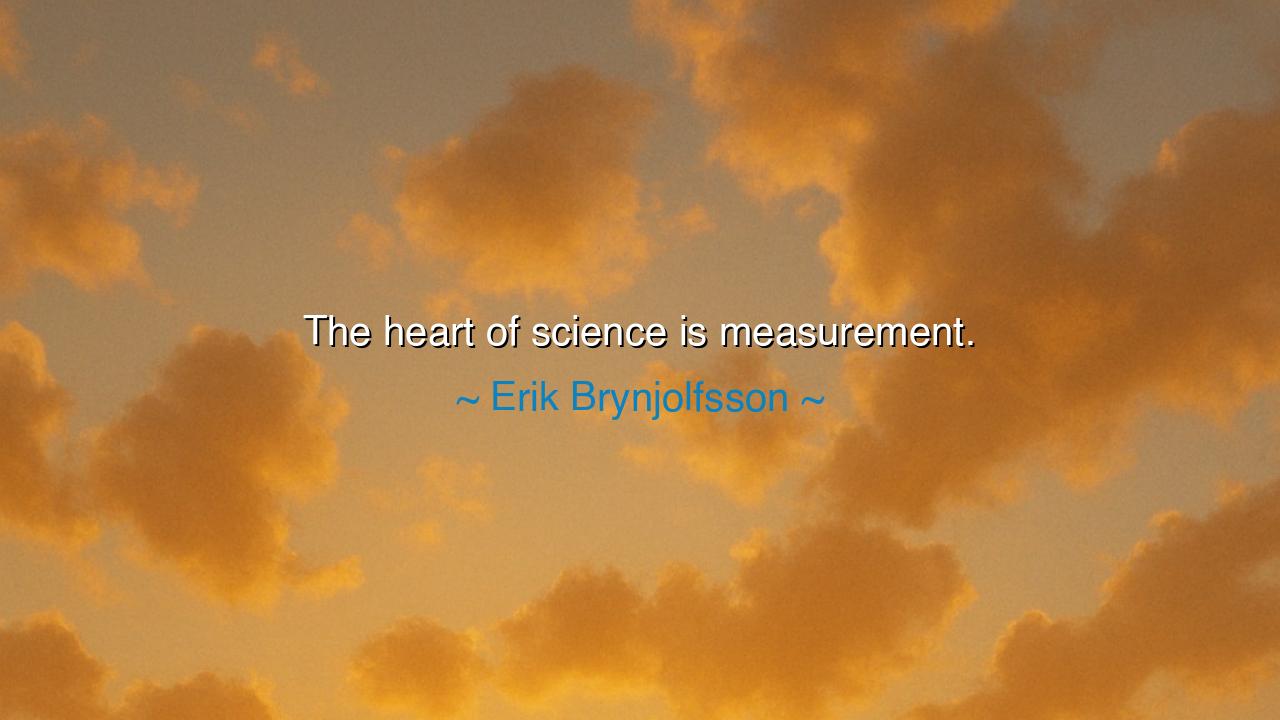
The heart of science is measurement.






“The heart of science is measurement.” Thus speaks Erik Brynjolfsson, a scholar of the new age, where data flows like rivers and knowledge is forged in the fires of numbers. Yet though these words come from a modern mind, their wisdom is ancient. For from the dawn of civilization, man has sought to bring the vastness of creation into order through the act of measurement—to weigh, to count, to compare, to bind the infinite within the grasp of the finite. Without measurement, knowledge drifts like a cloud without form; with it, knowledge gains shape, weight, and power.
Consider the builders of the pyramids of Egypt. Their stones did not rise by prayer alone, nor by strength of arms without guidance. It was the careful measurement of distance, angle, and weight that gave birth to monuments that stand even after four thousand years. Each block, aligned with precision, was testimony to the truth that greatness rests not in vague ambition but in careful reckoning. The ancients may not have spoken Brynjolfsson’s words, but they lived them: the heart of all achievement, whether in stone or in thought, beats with measurement.
So too in the age of Galileo, when the telescope turned skyward. Many before him had gazed at the heavens and woven myths of gods and beasts, but Galileo measured what he saw. He marked the paths of Jupiter’s moons, timed their revolutions, noted their consistency. Where imagination gave beauty, measurement gave truth. From his humble recordings was born a revolution, tearing down the old order and erecting a new cosmos where the Earth itself moved. His courage came not only from vision but from measured evidence, the unshakable foundation that silenced doubt.
There is power in this: for the human heart is prone to illusion, and the human mind to pride. Without measurement, we deceive ourselves, believing we see what we wish to see. History warns us in the folly of those who trusted opinion over evidence, such as the physicians who once resisted germ theory, ignoring the measurable proof of contagion. Their neglect cost countless lives. But when Louis Pasteur and Robert Koch measured the invisible world of microbes, charted their growth, and counted their effects, medicine itself was reborn. Here again, the heart of science proved to be measurement, the anchor that held truth against the tides of disbelief.
Yet let us not think measurement a cold or lifeless act. It is, in truth, the poetry of numbers, the language by which nature speaks to man. When the astronomer measures the pulse of a star, when the physicist measures the fall of an apple, when the economist measures the labor and wealth of nations, they are not diminishing reality—they are unveiling its hidden order. To measure is to listen carefully, to bow before reality and let it speak in the voice of precision. It is humility, clothed in rigor.
The lesson is eternal: without measurement, there is no true progress. Dreams remain dreams, untested and unproven. With measurement, dreams may be refined, corrected, and transformed into enduring works. To live wisely, one must not only feel, but also measure; not only imagine, but also test. This is not to destroy wonder, but to sanctify it, for wonder that survives measurement becomes truth, and truth is the greatest wonder of all.
And so, O listener, take this into your life: measure what you seek to improve. If you desire health, measure your steps, your food, your rest. If you seek wisdom, measure your learning, your progress, your errors. If you seek justice in society, measure the conditions of the people, the wealth, the freedom, the suffering—only then can words become deeds. For as Brynjolfsson has declared, the heart of science is measurement, and where there is no measurement, the heart itself ceases to beat.






AAdministratorAdministrator
Welcome, honored guests. Please leave a comment, we will respond soon